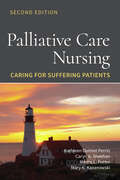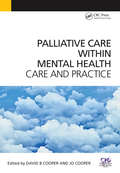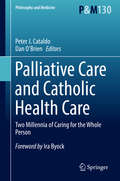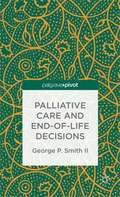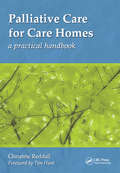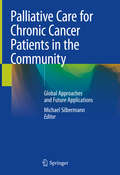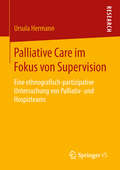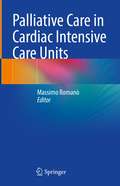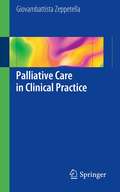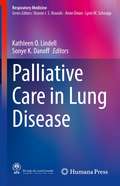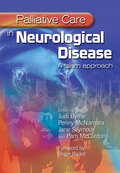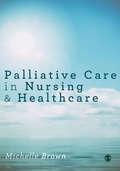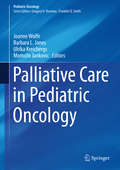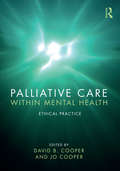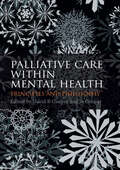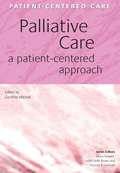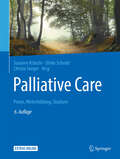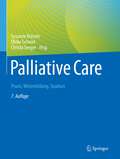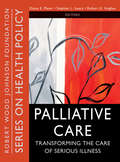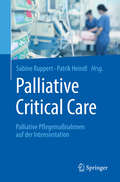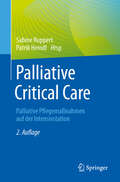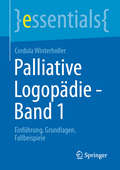- Table View
- List View
Palliative Care Nursing: Caring for Suffering Patients
by Kathleen Ouimet Perrin Caryn A. Sheehan Mertie L. Potter Mary K. KazanowskiAwarded first place in the 2022 AJN Book of the Year Awards in the Palliative Care and Hospice category.Preparing Nurses to Care for the Seriously Ill and their FamiliesPalliative Care Nursing: Caring for Suffering Patients continues to explore the concept of suffering as it relates to nursing practice in an updated new edition. This text helps practicing nurses and students define and recognize various aspects of suffering across the lifespan and within various patient populations, while providing guidance in alleviating suffering. In addition, the authors discuss ways nurses that witness suffering can optimize their own coping skills and facilitate personal growth. The Second Edition aligns with the recently updated ELNEC and AACN competencies and features three new chapters discussing advance care planning, palliative care for those with serious illnesses, and strategies for having difficult conversations with patients and families.How do we identify a patient who is suffering? How do we assess whether our patient (and/or their family) is coping with the event? What can we do to alleviate patient suffering? How can we convey the extent of the suffering to the other members of the healthcare team and advocate excellent palliative care for our patients? Palliative Care Nursing: Caring for Suffering Patients, Second Edition answers these questions and more, making it an indispensable resource for nursing students and nurses employed in a variety of health care settings. Updated to align with the recently revised ELNEC and AACN competenciesFeatures features three NEW chapters discussing advance care planning, palliative care for those with serious illnesses, and strategies for having difficult conversations with patients and familiesExplores physical, psychological, sociocultural, developmental, and spiritual sufferingIncludes new discussions on compassion fatigue and burnout, options for effective management of chronic pain, logotherapy, a new assessment of patient comfort, and moreRich in case studies, exercises, pictures, and reflections on nursing practice and life experiences This text is ideal for gerontology, palliative care nursing courses, capstone courses, and undergraduate nursing courses dealing with end of life issues, psychology, grieving, and palliative care. © 2023 | 400 pages
Palliative Care Within Mental Health: Care and Practice (Radcliffe Ser.)
by David Cooper Jo CooperThis thought provoking and highly practical book is not just about caring for the dying within mental health, but also applying the quality care and practice of palliative care within mental health practice. Multidisciplinary in its approach, it focuses on intervention, treatment, care and practice, and the similarities in practice between palliative care and mental health. This common ground is an excellent foundation for integrating palliative care into mental health care, practice and service delivery, succinctly covering all aspects of psychological, physical, social, spiritual, sexual and emotional health. Featuring authoritative contributions from international experts, each chapter develops a theoretical framework before broadening its scope to include application in practice - addressing what, when, where and why with a definite focus on implementation in practice. Self-assessment exercises, advice for further reading, ideas for reflective practice and summaries of key points are also included, aiming above all else to improve the relationships, responses, care and practice necessary to be effective in interventions and treatment with those experiencing mental health concerns and dilemmas. Ideal for all health, social, psychological, legal and spiritual care students and professionals wanting sound theoretical and practical guidance, this book is highly recommended for General Practitioners and General Practice Registrars, healthcare assistants studying NVQ and health visitors. Educationalists, managers and service developers in health and social care will also appreciate its solution-focused, practical approach.
Palliative Care and Catholic Health Care: Two Millennia of Caring for the Whole Person (Philosophy and Medicine #130)
by Peter J. Cataldo Dan O’BrienThis book offers a comprehensive overview of the compatibility of palliative care with the vision of human dignity in the Catholic moral and theological traditions. The unique value of this book is that it presents expert analysis of the major domains of palliative care and how they are compatible with, and enhanced by, the holistic vision of the human person in Catholic health care. This volume will serve as a critically important ethical and theological resource on palliative care, including care at the end of life, for bioethicists, theologians, palliative care specialists, other health care professionals, Catholic health care sponsors, health care administrators and executives, clergy, and students. Patients receiving palliative care and their families will also find this book to be a clarifying and reassuring resource.
Palliative Care and End-of-Life Decisions
by Ii George P. SmithTotal pain management mandates that an ethic of adjusted care be implemented at the end-stage of life which acknowledges ethically, legally, and clinically the use of terminal sedation as efficacious treatment.
Palliative Care for Care Homes: A Practical Handbook
by Christine ReddallCare home workers increasingly work with people nearing the end of their lives, including people with medically complex conditions. However, many do not have a medical background and find that practical advice on how to address these people's very specific needs is scarce. In this book, Christine Reddall draws on almost four decades of nursing expe
Palliative Care for Chronic Cancer Patients in the Community: Global Approaches and Future Applications
by Michael SilbermannThe new global cancer data suggests that the global burden has risen to 18.1 million new cases per year and 9.6 million cancer deaths per year. A number of factors appear to be driving this increase, in particular, a growing and aging global population and an increase of exposure to cancer risk factors linked to social and economic development. For rapidly-growing economies, the data suggests a shift from poverty- or infection-related cancers to those associated with lifestyles more typical in industrialized countries. There is still large geographical diversity in cancer occurrence and variations in the magnitude and profile of the disease between and within world regions. There are specific types of cancer that dominate globally: lung, female breast and colorectal cancer, and the regional variations in common cancer types signal the extent to which societal, economic and lifestyle changes interplay to deferentially impact on the profile of this most complex group of diseases.Unfortunately, despite advances in cancer care, a significant proportion of patients at home, experience sub-optimal outcomes. Barriers to successful treatment outcomes include, but are not limited to: access to oncologists in the primary health centers, non-adherence, lack of experienced oncology and palliative care nurses in the community, inadequate monitoring and the lack of training of family and pediatric physicians. Telemedicine approaches, including telephone triage/education, telemonitoring, teleconsultation and status tracking through mobile applications, have shown promise in further improving outcomes, in particular for chronic cancer patients following their hospitalization. Lessons can be learned from existing hospices in North America, the United Kingdom, Australia, Centers of Excellence in African (Uganda) and modern community services in India (Kerala). An important goal of this book is to describe and encourage professionals to develop new community programs in palliative care, which include training and empowering physicians and nurses in the community on the principles of palliative care. The Middle East Cancer Consortium (MECC) together with the American Society of Clinical Oncology (ASCO) and the American Oncology Nursing Society (ONS) have conducted multiple courses ranging from basic palliative care to more specialized training in palliative care for multiple nationalities in Europe, Asia and Africa. Our experience clearly indicates that, to promote such activities, one needs strong leadership and confirmed political will to support the endeavor. The new book will emphasize the importance of having a core of multiple stakeholders including community leaders, government, NGOs and media to be actively involved in advocating for the cause and generating public awareness.This text will provide the reader with a comprehensive understanding of the outside-of-the-hospital treatment of cancer patients by medical, paramedical and volunteer personnel. In doing so, this text will encourage the creation of new palliative care services improving upon the existing ones and stimulate further research in this field.Part 1 of the text will begin with an overview of the current state of affairs of services provided to cancer patients while being cared for by primary health centers. It will also review the current literature regarding medical and psychological-based therapy options in the community for cancer patients at different stages of their disease. Part 2 will address the unique role of the community nurse, within the framework of the multidisciplinary team treating the patient, in the attempt to provide optimal evaluation and care in very challenging situations (such as with terminal patients). Part 3 will provide insightful models of this new discipline and serve as a valuable resource for physicians, nurses, social workers
Palliative Care im Fokus von Supervision: Eine Ethnografisch-partizipative Untersuchung Von Palliativ- Und Hospizteams
by Ursula HermannUrsula Hermann geht den Fragen nach, wie Hospiz- und Palliativteams ihre beruflichen Anforderungen erleben und welche Themen sie in der Supervision zur Sprache bringen. Dafür untersucht sie das Feld der Hospiz- und Palliativversorgung mithilfe des Beratungssettings Supervision. Die ethnografische Methode der teilnehmenden Beobachtung gewährt Einblicke in Beratungsprozesse, die partizipative Forschungsstrategie ermöglicht eine Teilhabe an den Forschungsergebnissen für Supervisandinnen und Supervisanden. Die Erfahrungen und Handlungspraktiken der Berufsgruppen machen deutlich, welche Themenvielfalt sich in der Betreuung und Versorgung von Sterbenden und schwer kranken Menschen zeigt und welche Herausforderungen eine organisationale Einbettung von Palliative Care mit sich bringt.
Palliative Care in Cardiac Intensive Care Units
by Massimo RomanòThis book analyzes the main topics of Palliative Care in Cardiac Intensive Care Units (CICU), from the changing epidemiology of patients admitted to the ICU, to the main clinical and ethical issues. The changing epidemiology of patients has led to new and emerging patient needs at the end of life. Care has shifted from acute coronary syndrome patients towards elderly patients, with a high prevalence of non-ischemic cardiovascular diseases and a high burden of non-cardiovascular comorbid conditions: both increase the susceptibility of patients to developing life-threatening critical conditions. These conditions are associated with a significant symptom burden, high mortality rate, and increased length of stay. The main new challenges involve shared decision-making, symptom control (pain, dyspnea, etc.), and ethical issues (withholding/withdrawing life sustaining treatments, deactivation of implanted cardiac devices, palliative sedation), all of which necessitate formal education on end-of-life care. Written by opinion leaders in their respective fields, who share their experience with improving the cultural and clinical competence of medical/nursing teams, this volume is chiefly intended for cardiologists, anesthesiologists, palliative care doctors and nursing staff.
Palliative Care in Clinical Practice
by Giovambattista ZeppetellaWhen a person suffers from advanced, progressive illness, palliative care - treatments that improve the physical and psychological quality of life of patients and their families - can be just as important as treatments that aim to slow or prevent disease progression. Aimed at GPs and trainees, Palliative Care in Clinical Practice offers an accessible and practical introduction to palliative medicine, including a chapter devoted to each of the key areas of symptom management. Clearly and concisely written and fully illustrated throughout, it will be a useful resource for all healthcare professionals who wish to gain an understanding of this important aspect of medicine.
Palliative Care in Hematologic Malignancies and Serious Blood Disorders: A Clinical Guide
by Christina K. Ullrich Eric J. RoelandThis book provides a comprehensive, state-of-the-art overview on palliative care for patients with hematologic malignancies and other serious blood disorders. The text reviews the unique needs of this patient population, management strategies for hematologists/oncologists and palliative care clinician collaboration, and issues salient to the provision of palliative care, including communication, decision-making, advance care planning, symptom management, ethics, and nursing considerations. The book also spotlights special hematology populations, such as pediatric and older adult patients, and issues pertaining to the care of patients with blood disorders at the end of life.Divided into four sections, this book provides a comprehensive, state-of-the-art overview on palliative care for patients with hematologic malignancies and other serious blood disorders.Written by experts in the field, Palliative Care for Hematologic Malignancies and Serious Blood Disorders: A Clinical Guide is a valuable resource that will support and guide clinicians as they care for this patient population and address their particular needs.
Palliative Care in Lung Disease (Respiratory Medicine)
by Kathleen O. Lindell Sonye K. DanoffThis book details the benefits of palliative care to improve the lives of patients with serious lung disease and their caregivers. Palliative care is specialized medical care for people living with a serious illness. This type of care is focused on providing relief from the symptoms and stress of a serious illness, and is often described as “an extra layer of support” for patients and their caregivers, as patients with malignant and nonmalignant lung disease experience great symptom burden and have advanced care planning needs.This book has three main objectives:Define the role of palliative care in advanced lung diseaseIncorporate a patient-centered perspective in describing symptom burden and interventions to improve quality of lifeProvide current initiatives to expand evidence-based practice and improve access to palliative care Written by leading experts in palliative care and respiratory medicine, the chapters seek to answer those objectives by first defining and describing palliative care, advanced lung disease, and inadequate palliative care in this patient population. Patient reported outcomes, quality of life, and interventions to help deal with the psychological toll of serious illness are then detailed, as well as pharmacological and non-pharmacological interventions for symptom management. Detailed information is additionally provided on current research studies and management for several lung diseases, including COPD, ILD, Lung Cancer, Pulmonary Arterial Hypertension, Neuromuscular disease, and pediatric lung disease. The more administrative aspects of palliative care programs are then covered with an example of a specialty palliative care program for advanced lung disease and advice on how to address policy that promotes palliative care. Finally, palliative care's role during a pandemic is thoughtfully considered.This book is an ideal guide for clinicians, nurses, hospital administrators, teachers, students to help them understand and fill unmet care needs that many patients with serious lung disease experience.
Palliative Care in Neurological Disease: A Team Approach
by Jane Seymour Judi Byrne Penny McNamara Pam McClintonThe particular needs of people with progressive long-term neurological conditions - including Parkinson's Disease, Motor Neurone Disease (MND), Multiple Sclerosis (MS) and Huntington's disease - may make care delivery and planning the last stages of life ethically, practically and clinically challenging.
Palliative Care in Nursing and Healthcare
by Michelle BrownThis book helps nursing and healthcare students to prepare for the challenges of working with the increasing number of patients requiring palliative care, so that they can work in partnership with patients and their carers, providing care that is compassionate, practical and backed up by the latest evidence. Delivering palliative care can be emotionally challenging and the book focuses on supporting healthcare staff, allowing them to provide the care that is needed. Key features include: * case studies in every chapter, helping students to practically work through difficult scenarios * reflective activities that assist readers in thinking critically about their care and how to improve it * a holistic approach to palliative care that includes family, carers and interprofessional work * up to date theory and policy. Palliative Care in Nursing and Healthcare is suitable for undergraduate nursing students and allied health students and practitioners. Michelle Brown is Senior Lecturer at the University of Derby.
Palliative Care in Nursing and Healthcare
by Michelle BrownThis book helps nursing and healthcare students to prepare for the challenges of working with the increasing number of patients requiring palliative care, so that they can work in partnership with patients and their carers, providing care that is compassionate, practical and backed up by the latest evidence. Delivering palliative care can be emotionally challenging and the book focuses on supporting healthcare staff, allowing them to provide the care that is needed. Key features include: * case studies in every chapter, helping students to practically work through difficult scenarios * reflective activities that assist readers in thinking critically about their care and how to improve it * a holistic approach to palliative care that includes family, carers and interprofessional work * up to date theory and policy. Palliative Care in Nursing and Healthcare is suitable for undergraduate nursing students and allied health students and practitioners. Michelle Brown is Senior Lecturer at the University of Derby.
Palliative Care in Oncology
by Bernd Alt-Epping Friedemann NauckPalliative care provides comprehensive support for severely affected patients with any life-limiting or life-threatening diagnosis. To do this effectively, it requires a disease-specific approach as the patients' needs and clinical context will vary depending on the underlying diagnosis. Experts in the field of palliative care and oncology describe in detail the needs of patients with advanced cancer in comparison to those with non-cancer disease and also identify the requirements of patients with different cancer entities. Basic principles of symptom control are explained, with careful attention to therapy for pain associated with either the cancer or its treatment and to symptom-guided antineoplastic therapy. Complex therapeutic strategies for palliative cancer patients are highlighted that involve both cancer- and symptom-directed options and address a range of therapeutic aims. Issues relating to drug use in palliative cancer care are fully explored, and a separate section is devoted to care in the final phase. A range of organizational and policy issues are also discussed, and the book concludes by considering likely future developments in palliative care for cancer patients. Palliative Care in Oncology will be of particular interest to palliative care physicians who are interested in broadening the scope of their disease-specific knowledge, as well as to oncologists who wish to learn more about modern palliative care concepts relevant to their day-to-day work with cancer patients.
Palliative Care in Pediatric Oncology
by Joanne Wolfe Barbara L. Jones Ulrika Kreicbergs Momcilo JankovicThis textbook is the first to focus on comprehensive interdisciplinary care approaches aimed at enhancing the wellbeing of children with cancer and their families throughout the illness experience. Among the topics addressed are the epidemiology of pediatric cancer distress, including physical, emotional, social, and spiritual dimensions; the role of the interdisciplinary team; communication and advance care planning; symptom prevention and management; care at the end of life; family bereavement care; and approaches to ease clinician distress. The contributing authors are true experts and provide guidance based on the highest available level of evidence in the field. The book has not only an interdisciplinary but also an international perspective; it will appeal globally to all clinicians caring for children with cancer, including physicians, nurses, psychosocial clinicians, and chaplains, among others.
Palliative Care within Mental Health: Ethical Practice (Radcliffe Ser.)
by David B. Cooper Jo CooperPalliative Care Within Mental Health: Ethical Practice explores the comprehensive concerns and dilemmas that occur surrounding people experiencing mental health problems and disorders. Working beyond narrow, stereotypical definitions of palliative care as restricted to terminal cancer patients, this balanced and thought-provoking volume examines the many interrelated issues that face the individual, families, and caregivers, setting the groundwork for improved, ethical relationships and interventions. Chapters by experts and experienced practitioners detail the challenges, concerns, and best practices for ethical care and responses in a variety of individual and treatment contexts. This is an essential and thoughtful new resource for all those involved in the fast-developing field of palliative mental health.
Palliative Care within Mental Health: Principles and Philosophy
by David B. Cooper Jo CooperIs there a place for palliative care within mental health? This inspirational book offers an excellent foundation for integrating best-practice specialist palliative care into serious and enduring mental health service delivery. The shared practice values and vision between these two disciplines provide an optimistic starting point from which to address the lack of palliative care service delivery in mental health practice. Focusing on the similarity in philosophy between palliative care and mental health practice, it incorporates: . person-centred practice . relationship-based connectedness . a belief in compassionate care . respect for autonomy and choice . quality-of-life issues. The book addresses the practice skills needed in preparation for competent intervention and treatment. Each chapter develops a theoretical framework which is supported by practical application. Both professionals and students of palliative care will find the interactive text and practical case studies especially valuable, as will the professional working in substance use. Its userfriendly approach will appeal to a wide range of readers in various related disciplines. 'While it could be assumed that mental health has a lot to offer palliative care, we both [feel] that palliative care could offer more to mental health practice...It is a neglected area. There is little or no literature related to palliative care within serious mental health practice, and that which does exist relates to care of the dying in terms of cancer.' From the Preface.
Palliative Care: A Patient-Centered Approach
by Geoff MitchellAs the population in western cultures ages, more people suffer chronic, ultimately life-limiting diseases and medical professionals need to be equipped to cope with the ever growing pressure of palliative care. This book gives guidance on how to approach patients with life limiting illness. While the problems most people present to the doctor appear relatively straightforward, a whole person approach to understanding the complex interaction between the person, their illness and their environment should lead to a more complete consideration of the illness and better health outcomes. For issues of palliative care, such an approach is essential to identify and meet the many needs of desperately ill people. Palliative Care offers a fresh look at the management of patients. With international, evidence-based contributions, the book suggests practical and challenging ways to care for the dying. It is ideal for all healthcare professionals working in palliative care, General Practitioners and medicine and healthcare students.
Palliative Care: Praxis, Weiterbildung, Studium
by Susanne Kränzle Ulrike Schmid Christa Seeger Däubler-GmelinMenschen in ihrer letzten Lebensphase begleitenAlle beruflich Pflegenden und ehrenamtlich Begleitende finden in diesem Buch die notwendigen Kenntnisse für eine umfassende Betreuung von schwerstkranken und sterbenden Menschen und deren Angehörige zu: Prophylaxen, Therapien, Schmerzlinderung Kommunikation und Ethik Psychosoziale Betreuung Gesetzliche Grundlagen und Hinweise zur Finanzierung durch die Krankenkassen Besondere Situationen bei Kindern, Menschen im Wachkoma, mit geistigen Behinderungen und Demenz Neu in der 6. Auflage Psychosoziale Begleitung von Sterbenden und ihren AngehörigenPalliative Sedierung Besonderheiten im Sterben von Männern Palliative Care für Menschen am Rande der Gesellschaft Vom Wunsch zu Sterben und der Verantwortung der Betreuenden Sterbehilfe Existenzielle Verzweiflung Haltung im palliativen Kontext Akupressur, Hypnotherapie, Musiktherapie, Kunsttherapie Themenrelevante Gesetzestexte, zahlreiche Links und Adressen zu Patientenverfügung und Generalvollmacht sowie Musterschreiben für Betreuer und Ärzte finden Sie auf unserer Website.
Palliative Care: Praxis, Weiterbildung, Studium
by Susanne Kränzle Ulrike Schmid Christa SeegerMenschen in ihrer letzten Lebensphase begleitenAlle beruflich Pflegenden und ehrenamtlich Begleitenden von schwerstkranken und sterbenden Menschen und deren Zugehörigen finden in diesem Buch die notwendigen Kenntnisse zu Themen und Fragestellungen rund um Sterben, Tod und Trauer:Prophylaxen, Therapien, SchmerzlinderungKommunikation und EthikPsychosoziale BetreuungGesetzliche Grundlagen und Hinweise zur Finanzierung durch die KrankenkassenBesondere Situationen bei Kindern, Menschen im Wachkoma, mit geistigen Behinderungen und DemenzPsychosoziale Begleitung von Sterbenden und ihren AngehörigenPalliative SedierungBesonderheiten im Sterben von MännernPalliative Care für Menschen am Rande der GesellschaftVom Wunsch zu Sterben und der Verantwortung der BetreuendenSuizidassistenzExistenzielle VerzweiflungHaltung im palliativen KontextAkupressur, Hypnotherapie, Musiktherapie, Kunsttherapie, TrauerDie 7. Auflage ist komplett überarbeitet und aktualisiert.
Palliative Care: Transforming the Care of Serious Illness (Public Health/Robert Wood Johnson Foundation Anthology #33)
by Robert Hughes Diane E. Meier Stephen L. IsaacsPalliative Care is the first book to provide a comprehensive understanding of the new field that is transforming the way Americans deal with serious illness. Diane E. Meier, M.D., one of the field's leaders and a recipient of a MacArthur Foundation "genius award" in 2009, opens the volume with a sweeping overview of the field. In her essay, Dr. Meier examines the roots of palliative care, explores the key legal and ethical issues, discusses the development of palliative care, and presents ideas on policies that can improve access to palliative care. Dr. Meier's essay is followed by reprints of twenty-five of the most important articles in the field. They range from classic pieces by some of the field's pioneers, such as Eric Cassel, Balfour Mount, and Elizabeth Kübler-Ross, to influential newer articles on topics such as caregiving and cost savings of palliative care. The reprints cover a wide range of topics including: Why the care of the seriously ill is so important Efforts to cope with advanced illness Legal and ethical issues Pain management Cross-cultural issues Philosophical perspective The demand for palliative care has been nothing short of stunning—largely because of palliative care's positive impact on both the quality and the cost of care provided to seriously ill individuals. By providing a wide-ranging perspective on this growing field, this book will serve as a guide for developing meaningful approaches that will lead to better health care for all Americans.
Palliative Critical Care: Palliative Pflegemaßnahmen auf der Intensivstation
by Sabine Ruppert Patrik HeindlEtwa 5 bis 30 Prozent der Patienten auf der Intensivstation versterben unter palliativen Maßnahmen. Das zeigt die Notwendigkeit der Integration von Palliative Care im intensivmedizinischen Bereich auf. Das Buch führt erstmalig die Gemeinsamkeiten der Intensiv- und Palliativpflege praxisorientiert zusammen und etabliert das neue Verständnis von Palliative Critical Care (PCC). Allgemeine Kapitel beschäftigen sich mit dem Sterben an sich und dem heutigen Stand von Critical Care und Palliative Care. Des Weiteren werden wichtigen Themen zur ethischen Entscheidungsfindung und die Kongruenz bzw. Divergenz von Critical Care und Palliative Care diskutiert. Konkrete pflegerische Handlungen zur Linderung von häufigen Symptomen werden ebenso vorgestellt wie der psychosoziale Umgang mit Angehörigen sowie Sterbebegleitung unter den eingeschränkten Rahmenbedingungen auf der Intensivstation. Das Buch richtet sich in erster Linie an Pflegefachkräfte aus dem Intensiv- und Palliativbereich und möchte für diese Zielgruppen einen wichtigen Beitrag zur Sensibilisierung für Problemlagen von Patienten am Lebensende auf Intensivstationen leisten.
Palliative Critical Care: Palliative Pflegemaßnahmen auf der Intensivstation
by Sabine Ruppert Patrik HeindlDas Buch führt erstmalig die Gemeinsamkeiten der Intensiv- und Palliativpflege praxisorientiert zusammen und etabliert das neue Verständnis von Palliative Critical Care (PCC). Allgemeine Kapitel beschäftigen sich mit dem Sterben an sich und dem heutigen Stand von Critical Care und Palliative Care. Des Weiteren werden wichtigen Themen zur ethischen Entscheidungsfindung und die Kongruenz bzw. Divergenz von Critical Care und Palliative Care diskutiert. Konkrete pflegerische Handlungen zur Linderung von häufigen Symptomen werden ebenso vorgestellt wie der psychosoziale Umgang mit Angehörigen sowie Sterbebegleitung unter den eingeschränkten Rahmenbedingungen auf der Intensivstation. In der Neuauflage wurden die bestehenden Inhalte mit der COVID-19 Pandemie in Verbindung gebracht. Zudem gehen neue Kapitel auf die klinische Ethikberatung und Möglichkeiten der Vorsorgeplanung für das Lebensende ein. Thematisiert werden auch Medical Assistance in Dying (MAiD) und der freiwillige Verzicht auf Nahrung und Flüssigkeit, sowie das Aufklärungsgespräch und die Kommunikation. Das Buch richtet sich in erster Linie an Pflegefachkräfte aus dem Intensiv- und Palliativbereich und möchte für diese Zielgruppen einen wichtigen Beitrag zur Sensibilisierung für Problemlagen von Patienten am Lebensende auf Intensivstationen leisten.
Palliative Logopädie - Band 1: Einführung, Grundlagen, Fallbeispiele (essentials)
by Cordula WinterhollerDie Logopädie als therapeutischer Baustein findet nur langsam ihren Platz im interdisziplinären Team des Palliative Care Settings. Dabei gehört zu den Aufgaben von Logopäd*innen und Sprachtherapeut*innen auch die Versorgung von schwerstkranken und sterbenden Menschen auf der Palliativstation, im Hospiz oder zu Hause. Bei neuro-palliativen Patienten stehen dabei die Behandlung von Schluck-, Sprach-, Sprech- und Stimmstörungen im Fokus. In diesem Essential erfahren Sie, welche Zielsetzungen, Maßnahmen und Methoden die palliative Logopädie als neuer Fachbereich innerhalb der Logopädie einnehmen kann. Dieser Band 1 beschreibt die Entstehungsgeschichte, Möglichkeiten der Qualitätssicherung und Assessments im therapeutischen Alltag. Fallbeispiele geben wertvolle Tipps für die Mundpflege und zum Thema Spiritualität. Anamnese-, Beobachtungsbögen und ein Essensprotokoll unterstützen die Verlaufskontrolle bei Schluckstörungen. Band 2 beinhaltet die Themen Ethik, Beratung und Selbstfürsorge, Band 3 das Thema Angehörigenarbeit.
